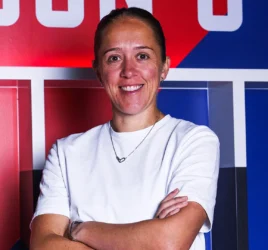Do you remember the days when we wondered when brands would finally start showing a commitment to the women’s game?
Well those days of waiting are definitely now over. The Football Association has today announced another milestone partnership for the domestic game, to add to a series of high-profile deals.
Vitality, the health and life insurance and investment company, have signed a three-year deal to sponsor the Women’s FA Cup, the largest cup competition in the country.
“It’s an absolutely perfect fit for us. We’ve got a shared vision around transforming the women’s game and delivering high profile, top level women’s football. But aligned to that, we’ve got a vision that will inspire future generations of Alex Scotts out there to want to play women’s football and get active and get healthy.”
KELLY SIMMONS, FA DIRECTOR OF THE WOMEN’S PROFESSIONAL GAME
When you think about it, it is a natural fit. Vitality have been invested in women’s support for a long time – from netball to hockey to cricket – with female ambassadors such as Jess Ennis-Hill, Ellie Simmonds and Tracy Neville. Just last week, they announced six new partnerships with women’s football teams for the coming season – AFC Bournemouth, Crystal Palace, Leeds United, Leicester City, Newcastle United and Southampton FC were added to sponsorships already in place with Chelsea and Cardiff City.
Their commitment to women’s sport is telling and Managing Director, Nick Read, is keen to emphasise their pride in taking on this partnership:
“Our involvement in women’s sport has been a function of what we stand for as a company, in terms of wanting to make our members healthier and make the UK healthier…When we went into the world of sponsorship, we recognised very quickly that women were hugely underrepresented at all levels from a participation and grassroots level, all the way through to a national level and the leagues in between. Therefore, we wanted to associate ourselves with sports or competitions where we can truly make a difference; where in every pound that we invested, we could see what impact that was having…We sat down to understand where they [the FA] wanted to take this competition and how they could make it as iconic as the men’s competition. This is a competition dressed in romanticism and we wanted to ensure we got that same level from a participation and grassroots level and also from a viewership level.”
It was also announced this week that former Arsenal captain and Lioness, Alex Scott, would become the latest female sports star to join Vitality as an ambassador. With her trophy-laden career on the pitch – she has won this competition seven times – and her success moving into punditry, she is one of the best placed figures in the game to understand how far the game has come, and how far it still has to go:
“For me, I’ve always known my responsibility from when I was a player to even now sitting on TV. I’ll be doing the FA Cup games with the BBC just to help develop and grow this game. We’re in a fantastic place but we still want to keep growing it.”
In becoming Vitality’s latest ambassador, she spotted an opportunity to further her ambitions to keep pushing the game forwards:
“I’ve always admired Vitality and what they’ve done in the women’s space. The word I like, that Vitality use a lot, is partnership…And I believe from when I’ve had conversations with their other ambassadors, that this is a partnership where I can continue my role to make the game and players as visible as they can be and to help develop our sport.”
This deal is a big step forward for the FA. Despite the threat to women’s football and sport in general throughout the pandemic, the game has proved so far to continue its progress forward. From overseas rights deals for the FAWSL to over three million tuning into watch the live and highlights package for the Community Shield, the picture does not look as bleak as it might have once done. The momentum is something that makes Kelly Simmons, the FA’s Director of the Women’s Professional Game, confident about where the sport is at:
“You would think at the moment that sport sponsorship would be a difficult space to try and get new partners in at the moment because nobody knows the true impact yet of Covid, in every industry and every walk of life…This just demonstrates, even more so than usual, Vitality’s commitment to women’s sport and women’s football. And where women’s football is at in this country that it can bring a big brand in like Vitality. Investing significantly right now in this climate is a fantastic marker.”
For the team, it is straight to work, with the sponsorship including the conclusion of the 2019/20 competition. The quarterfinals are set to go ahead on the 26/27 September and the challenge is there to continue to attract an audience while fans are not allowed into stadia. As Read says, it will require “a creative and collective effort from all of the parties involved” to make sure there is a buzz around the last three rounds of the competition.
It’s got a wonderful history and the final at Wembley is particularly the place where players want to be. It’s the big moment in the domestic calendar so we were really excited by Vitality’s help to continue to grow that interest. We want it to be the biggest cup competition in the world for women’s sport.
KELLY SIMMONS, FA DIRECTOR OF THE WOMEN’S PROFESSIONAL GAME
And what about the future? Well the sky’s the limit for this prestigious competition. Everyone wants to get to Wembley – players and fans alike – and with this support, it can only continue to grow and be the pinnacle of the football calendar.


